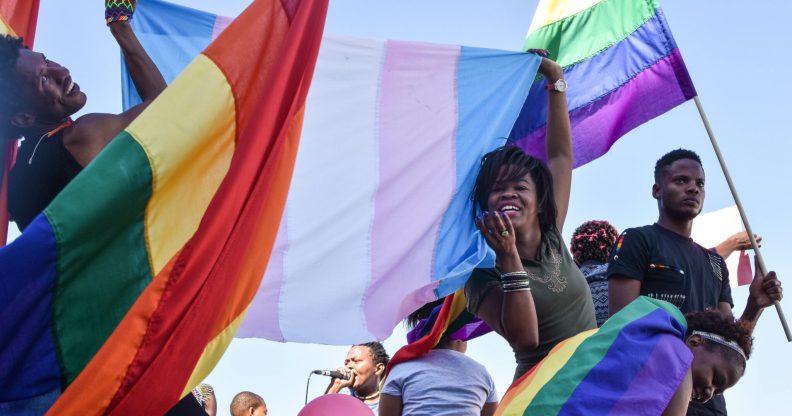Namibia on track to finally decriminalise gay sex: ‘Freedom will ring!’

Dozens of people cheer and dance as they take part in the Windhoek LGBT+ Pride. (HILDEGARD TITUS/AFP via Getty Images)
Namibia is on pace to decriminalise homosexuality by the end of the year as ministers pave a long-sought path to scrapping its decades-old anal sex ban.
The government’s Law Reform and Development Commission, a law reform agency, recommended in reports published Monday (17 May) that the country’s sodomy laws be overturned.
Justice minister Yvonne Dausa confirmed to the Windhoek Observer, a local newspaper, that she will be submitting draft proposals to the cabinet to do just that in two weeks time – with a potential for the ban to be binned by the end of the year.
As the committee reports were handed to her department, Dausa said that state-sanctioned homophobia must come to an end, the Windhoek Express reported.
“No Namibian should be comfortable with any part of our society feeling either they are second class citizens, that they are being excluded, or stigmatised and discriminated against either on the basis of their sexual orientation, or the basis of their disability, or status in a particular society,” she said.
In one report, committee members wrote that the ban’s “very existence violates the fundamental rights of the individuals who could be affected, as well as creating and reinforcing a culture of homophobia and intolerance against LGBT+ people”.
“The continued existence of this law cannot be justified” as it “interferes with the constitutional and international law rights of individuals in Namibia”.

Participants of the Swakopmund Gay Pride. (Oleksandr Rupeta/NurPhoto via Getty Images)
Committee members stressed in their report that between 2012 and 2019, 23 men were arrested on sodomy charges.
The provisions might only infrequently enforced, but they still reduce queer people to “criminals” and “enough to create a realistic fear of possible arrest”.
Dausa stressed in a statement to the Observer that the reports are not law, “but rather informed conclusions based on legal research” by the commission.
“After which it will go through the normal law-making process,” Dausa explained of the next steps.
“Principal approval from Cabinet, scrutiny from the Cabinet Committee on Legislation, possible further discussions with the Law Reform and Development Commission, certification from the Attorney General, drafters and then National Assembly.
“I think give or take we may see this go to the NA before the year ends.”
Namibia’s laws around being queer have long been one of mixed messages. Indeed, being gay per se is perfectly legal in the republic – anal sex, however, is illegal and has been since the late 1800s.
When Namibia gained independence 1990, it inherited the colonial-era Roman-Dutch sodomy provisions, locking the ban into place for decades to come.
Ever since the laws have rarely been enforced and attitudes towards LGBT+ people have overall eased. Namibia’s lawmakers and officials have, often in fits-and-bursts, sought to scrap the ban, but progress remains spotty and sluggish.
“Freedom will ring,” wrote advocacy group Equal Namibia on Facebook.
“The future is equal because every one of you stood up and demanded justice for all vulnerable Namibians.
“Stay in this fight for equality with us.”

